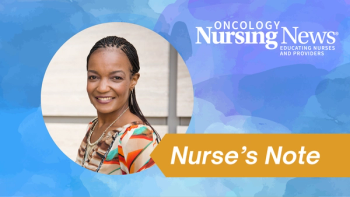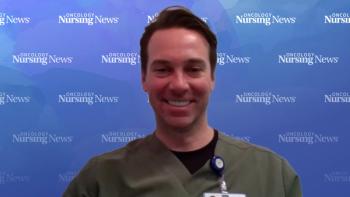
- January/February 2019
- Volume 1
- Issue 1
Videoconferencing Empowers Distance Caregivers to Be More Involved in Care
DCGs experience higher levels of anxiety and mood disturbance compared with local caregivers. On top of dealing with the expected stress of having a loved one who received a diagnosis of cancer, DCGs describe feelings of uncertainty, guilt, anxiety, and stress specifically related to their distance from the patient.
Distance caregiving is a relatively new phenomenon associated with today’s increasingly mobile society. Distance caregivers (DCGs)—those unable to attend a family member’s oncology appointments due to distance—often miss out on supportive services offered to the patient and local family and must rely on secondhand information to keep track of the patient’s plan of care. The Frances Payne Bolton School of Nursing at Case Western Reserve University in Cleveland, Ohio, is testing a program to address the needs of this unique demographic by incorporating videoconferencing into patient visits.
DIFFICULTIES OF DISTANCE CAREGIVING
Significant travel time and cost prevent DCGs from being able to see the patient and attend oncology appointments regularly. DCGs report spending an average of $392/month on travel and out-of-pocket expenses related to caregiving and consistently missing days of work.1 On the rare occasions DCGs can visit for an appointment, their presence can be disruptive because they have not been in the loop from the beginning.
DCGs experience higher levels of anxiety and mood disturbance compared with local caregivers. On top of dealing with the expected stress of having a loved one who received a diagnosis of cancer, DCGs describe feelings of uncertainty, guilt, anxiety, and stress specifically related to their distance from the patient.2 These poor psychological outcomes not only negatively affect the DCGs’ lives but also hinder their ability to provide meaningful support to the patient and local family.
Videoconference technology may be an effective way for DCGs to both be “present” for important discussions between the patient and oncologist and avoid the practical and financial burdens of missing work and traveling to attend appointments in person.
INTERVENTIONS
Investigators at the Frances Payne Bolton School of Nursing are testing 3 technology interventions: individualized coaching, videoconferencing for oncology appointments, and a DCG website. Coaching sessions are delivered via videoconference with an advanced practice registered nurse or licensed independent social worker. During 4 monthly meetings, DCGs are given tailored informational and emotional support to help them navigate the healthcare system and advocate for their loved one from a distance. The oncology appointment videoconferencing allows DCGs to connect during the patient’s appointments with the medical oncologist over a 4-month period. They are able to see the patient, ask the oncologist questions, and participate in discussions as if they were attending in person. Finally, the website has links to information and resources relevant to DCGs of patients with cancer, including a video tour of the cancer center where their loved one is receiving care. Patients and DCGs answer surveys about distress, anxiety, and depression at baseline, 4 months (end of intervention), and 6 months (2 months post intervention). In addition, DCGs answer questions to assess self-efficacy, caregiver burden, and emotional support. Patients, local caregivers, DCGs, and oncologists provide feedback at the end of the intervention to share their perceptions of how the videoconferencing affected the appointments.
EARLY RESULTS
As of this writing, 301 patient-DCG dyads have been enrolled out of an anticipated final sample size of 419. Patients have a mean age of 65 years old, and the most common diagnoses are gastrointestinal (31%), breast (21%), and hematologic (18%) malignancies. DCGs are, on average, 46 years old, white (65%), college educated (75%), an adult child of the patient (66%), and employed full time (72%). They live a median distance of 402 miles away from the patient, with the farthest living in Asia. Implementation has been successful, with research staff successfully integrating the videoconference intervention into 32 outpatient oncology clinics. The technology has been well received by patients, local family, DCGs, and clinical staff.
At baseline, DCGs reported a mean distress score of 4.34 (SD = 2.66) on the National Comprehensive Cancer Network (NCCN) distress thermometer (0-10 scale of distress felt in the past week). According to the NCCN Guidelines for Distress Management, a score of 4 or higher merits a referral to social work or counseling services.3 DCGs had a mean anxiety score of 55 and depression score of 51 on the 4-item Patient-Reported Outcomes Measurement Information System questionnaires. Scores of ≥55 are considered outside the normal range.4 Over half of DCGs reported at least some interference with both work (54.5%) and personal activities (55.3%) because of their caregiving responsibilities.
These preliminary findings, together with previous research, show that this population of caregivers has unique stressors that often go unaddressed. They are also underused as both a source of support for the patient and a source of information for the clinical staff, particularly for patients who do not have local family to attend oncology appointments with them.
Videoconferencing provides a simple and feasible way to give DCGs the opportunity to support their loved ones and play a role in clinical decision making from afar. Cancer is a disease that affects the entire family, and videoconference technology is a promising tool for uniting families with clinicians.
REFERENCES1. Koerin BB, Harrigan MP. P.S. I love you: long-distance caregiving. J Geront Soc Work. 2003;40(1-2):63-81. doi: 10.1300/J083v40n01_05.2. Mazanec P. Distance caregiving a parent with cancer. Semin Oncol Nurs. 2012;28:271-278. doi: 10.1016/j.soncn.2012.09.010.3. National Comprehensive Cancer Network. NCCN Clinical Practice Guidelines in Oncology: distress management. rnccn.org/professionals/physician_gls/pdf/distress. pdf. Published February 23, 2018. Accessed January 16, 20194. Wagner LI, Schink J, Bass M, et al. Bringing PROMIS to practice: brief and precise symptom screening in ambulatory cancer care. Cancer. 2015;121(6):927-934. doi: 10.1002/cncr.29104.
Eric Blackstone, MA, is a research assistant; Sara L. Douglas, PhD, RN, is the Arline H. and Curtis F. Garvin Professor in Nursing Excellence and assistant dean for research; and Amy R. Lipson, PhD, is a senior research associate at the Frances Payne Bolton School of Nursing at Case Western Reserve University in Cleveland, Ohio.
Articles in this issue
almost 7 years ago
Paying It Forward: The Road to an Oncology Nursing Careeralmost 7 years ago
Palliative Care Is Not Just for End of Lifealmost 7 years ago
Tired of Hearing People Say an Oncology Nurse's Job Is Depressing?almost 7 years ago
CDK4/6 Inhibitors Are Tested in Adjuvant Settingalmost 7 years ago
Learning the Hard Wayalmost 7 years ago
Oral Oncolytics Are Changing Nursing Practicealmost 7 years ago
Improving Palliative Care Through EducationNewsletter
Knowledge is power. Don’t miss the most recent breakthroughs in cancer care.




















































































